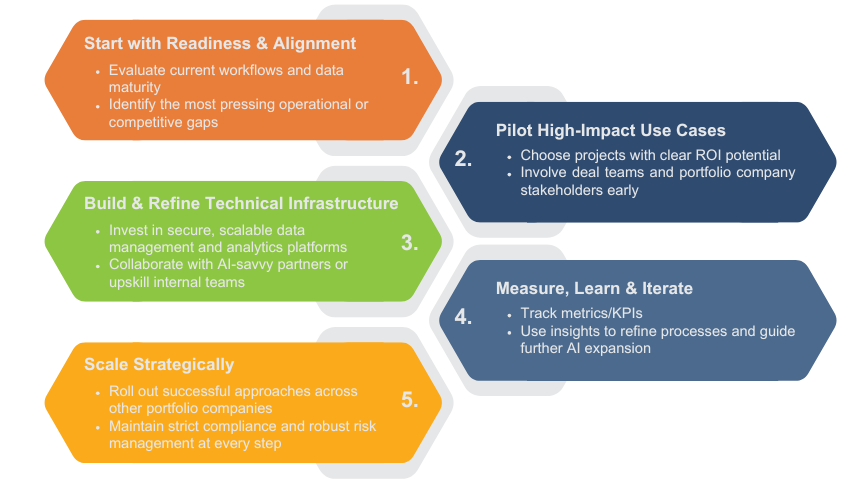AI in 2025: A New Era for Mid-Sized Private Equity Firms

The private equity landscape for mid-sized portfolio managers is experiencing significant transformation in 2025, particularly in how they approach AI integration and value creation.
Strategic AI Integration for Mid-Market Success
While larger firms have traditionally led in technology adoption, mid-sized firms are finding creative ways to leverage AI for portfolio value enhancement, particularly through operational improvements rather than high-level strategic changes.
Key Value Creation Opportunities
Mid-sized PE firms are increasingly focusing on operational efficiencies through AI implementation. This includes streamlining due diligence processes and enhancing portfolio management through data-driven insights. The ability to process vast amounts of information quickly gives these firms a competitive edge in deal sourcing and evaluation, despite having smaller teams than their larger counterparts.
For example BC Partners developed APIs that allow pre-trained AI language models to analyze unstructured proprietary data, reducing deal sourcing time by 50-60%.
Another great example of these advancements are in the healthcare sector which has particularly strong opportunities for mid-sized PE firms, with AI investments in biopharma seeing a 300% increase since 2023.
Some of the ways PE firms are finding to leverage AI include:
Deal Sourcing
-
- Identification of Opportunities:
- Enhancing the identification of potential investment targets.
- Identifying add-on opportunities in the private markets.
- Information Filtering:
- Streamlining the collection and filtering of information from news, conference presentations, media statements, and market trends.
- Surfacing relevant information that may not have been previously considered.
- Identification of Opportunities:
Internal Processes
-
- Search and Retrieval:
- Improving search capabilities within proprietary data and external sources.
- Data Analysis:
- Automating and enhancing data analysis tasks.
- API Development:
- Building APIs to integrate generative AI large language models (LLMs) with proprietary unstructured and unlabeled data.
- Search and Retrieval:
Due Diligence
-
- Rapid Data Searches:
- Quickly searching through virtual data rooms (VDRs) and publicly available data using AI prompts.
- Market and Competitor Analysis:
- Conducting comprehensive market scans and gathering competitor information.
- Automated Data Processing:
- Utilizing code interpreters to process large datasets (e.g., customer spend data) without requiring coding skills from associates.
- Cut reduce due diligence document review time by as much as 70% as well.
- Rapid Data Searches:
Portfolio Operations
-
- Operational Efficiency:
- Leveraging AI in software development, legal operations, marketing, data analysis, and other functional areas within portfolio companies.
- Performance Improvement:
- Enhancing overall operational performance and efficiency across portfolio companies through AI-driven solutions.
- Operational Efficiency:
Sector-Specific Value Creation in the Portfolio Companies
-
- Software/IT Services:
- Efficient code generation, error detection, and creation of testing scripts.
- Media:
- Democratizing content generation and reducing associated costs.
- Consumer:
- Enhancing customer service with more targeted and personalized information for call center reps or chatbots.
- Improving ROI on target marketing and conducting sentiment analysis.
- Healthcare/Pharma:
- Accelerating research and development (R&D) and the discovery of new drugs or molecules.
- Automating document processing and medical image recognition in health services.
- Other Functional Areas:
- Enhancing sales and marketing, legal, customer service, IT, and knowledge management through AI applications.
- Software/IT Services:
Investment Strategy
-
- Focus on AI-Leveraging Companies:
- Investing in software companies that effectively integrate generative AI and LLMs into their products and workflows.
- Avoiding Direct AI Ventures:
- Steering clear of direct venture investments in rapidly evolving AI technologies to mitigate risks related to obsolescence and disruption.
- Evaluating AI Impact:
- Assessing how generative AI or conventional AI might benefit or disrupt target companies across all investment sectors.
- Focus on AI-Leveraging Companies:
Operational Efficiency Enhancements
-
- Faster Information Gathering:
- Reducing the time and effort required for information gathering and filtering.
- Discovery of New Opportunities:
- Potentially uncovering opportunities that were previously unrecognized or unconsidered.
- Potentially cut processing costs by up to 70% in transaction document management.
- Faster Information Gathering:
Risk Management
-
- Controlled Experimentation:
- Experimenting and iterating with AI technologies cautiously to stay aligned with the evolving landscape.
- Avoiding Overcommitment:
- Not overextending in AI investments to prevent being outpaced by technological advancements.
- Controlled Experimentation:
Challenges in AI Implementation
Private equity firms implementing AI face several challenges that complicate adoption.
-
- Data quality and standardization issues create fundamental obstacles
- Integration with existing systems and workflows requires significant technical infrastructure upgrades.
- Finding and retaining AI talent remains difficult, as firms compete for scarce data scientists and machine learning experts.
- Regulatory compliance and data privacy concerns add layers of complexity, particularly when dealing with sensitive financial information.
- The substantial investment required for AI implementation, coupled with difficulties in demonstrating clear ROI, makes it challenging to justify the expense.
- Cultural resistance to change and the need to balance human judgment with automation present organizational hurdles that firms must carefully navigate while maintaining their core investment strategies.
Overcoming Challenges
PE firms are implementing several strategic solutions to overcome the AI adoption challenges. Firms that successfully implement these solutions are better positioned to leverage AI’s benefits while managing associated risks and challenges effectively. Some of the solutions include:
Technical Solutions
-
- Implementing robust cloud infrastructure and data management systems
- Partnering with specialized AI companies as an intermediary approach rather than building in-house capabilities
- Developing customized deal-targeting platforms with predictive analytics capabilities
- Using encryption, access controls, and data anonymization to address security concerns
Operational Approaches
-
- Establishing dedicated AI committees to accelerate development and implementation
- Starting with proof-of-concept projects to test AI capabilities before full deployment
- Focusing on high-ROI solutions while building data literacy across the organization
- Integrating AI gradually, beginning with lower-risk tasks and routine operations
Talent Management
-
- Building in-house data science teams for specialized AI development
- Adopting contract-to-hire models for AI project maintenance
- Investing in training programs to upskill existing employees
- Creating partnerships with AI companies to access specialized expertise
Risk Management
-
- Establishing strict data governance policies and conducting regular security audits
- Implementing comprehensive risk assessment frameworks
- Developing transparent and auditable AI systems for regulatory compliance
- Creating synthetic data generation solutions for secure testing
Getting started: A Roadmap
If your firm is not deep into AI yet, it will be and you will need to know where to start. At a high level here is a description of a strategic roadmap for mid-sized private equity firms looking to integrate AI. It highlights the essentials from the groundwork to scaling proven solutions while keeping an eye on both near-term gains and long-term value.
By approaching AI adoption in a structured, phased way, mid-sized PE firms can unlock rapid efficiencies, gain competitive advantages, and future-proof their operations against shifting market dynamics.

Looking Forward
Mid-sized private equity firms in 2025 have a significant opportunity to redefine their impact. Those that integrate AI effectively into their operations can deepen their strengths, uncover new efficiencies, and expand into high-growth sectors. Success will depend on applying AI with precision, ensuring it complements existing expertise while opening doors to new possibilities.
Rather than mirroring the strategies of larger firms, mid-sized firms are best served by aligning AI adoption with their agility and sector-specific focus. This combination positions them to deliver tailored value, drive portfolio performance, and maintain a competitive edge in a rapidly evolving landscape.
Find the right partner
Technology expertise and strategic guidance have become critical components for successful AI integration, particularly for firms that may not have extensive internal resources. This highlights the growing importance of technology advisory partnerships in achieving sustainable competitive advantages in the evolving PE landscape.
Question for you
The question now is: Are you ready to align your strategy with the tools and insights that will shape the next decade of private equity?
—
What do you think is the biggest challenge, or opportunity mid-sized PE firms face when integrating AI into their operations?
Share your thoughts with us, we’d love to hear your perspective.